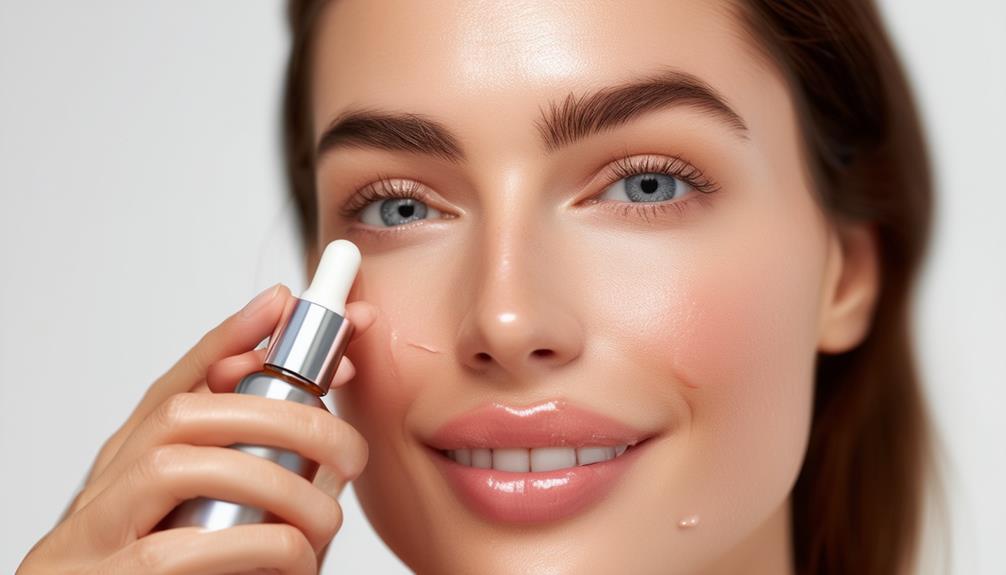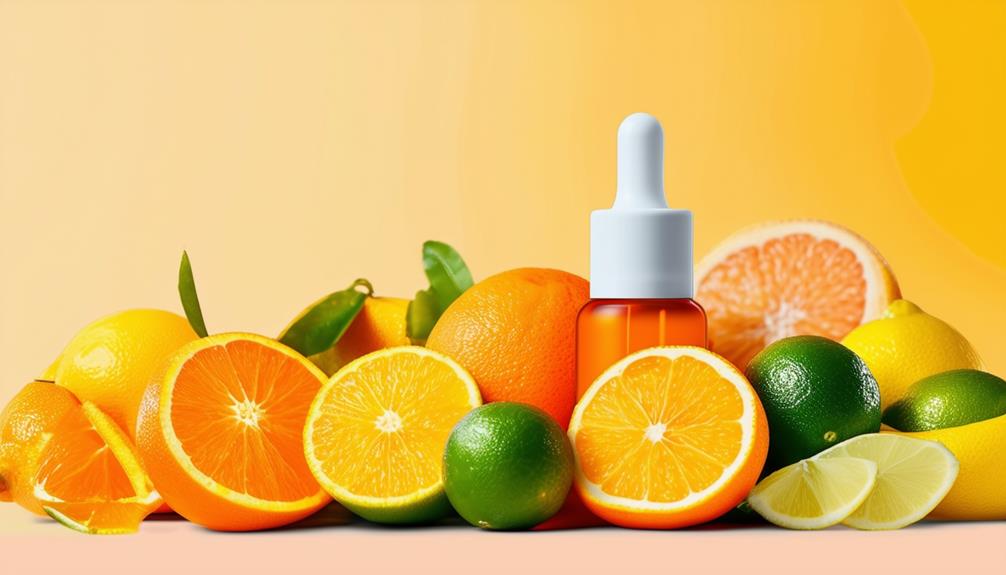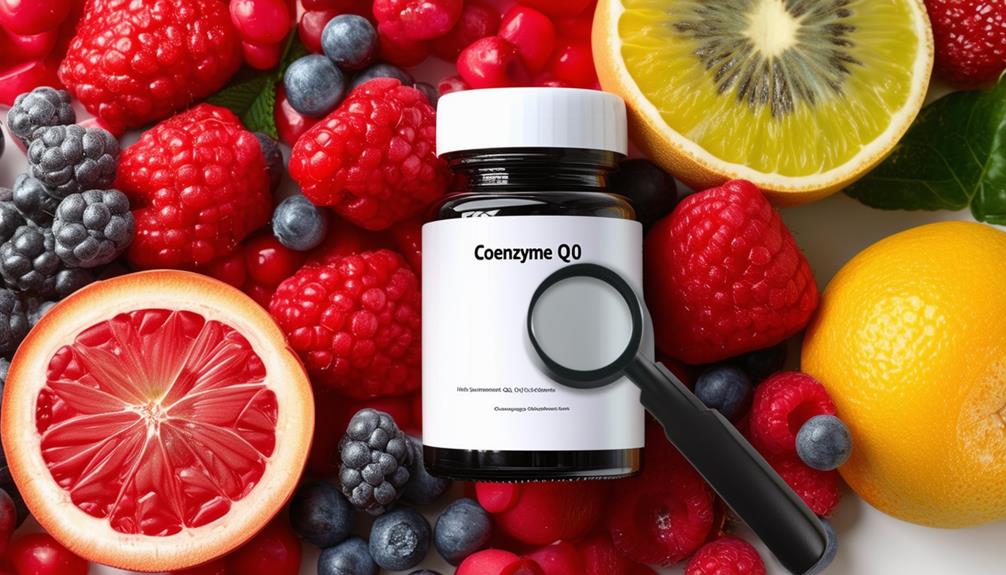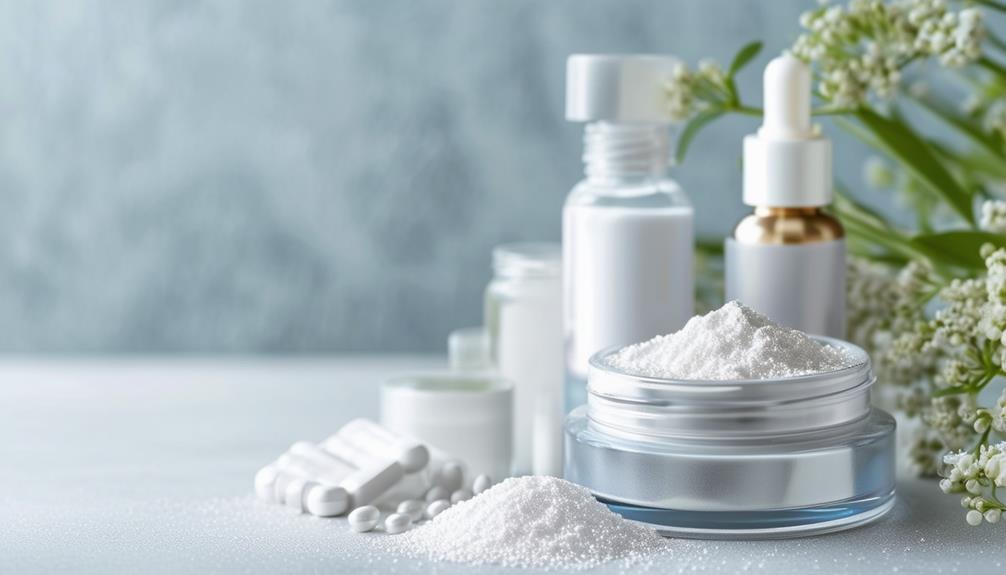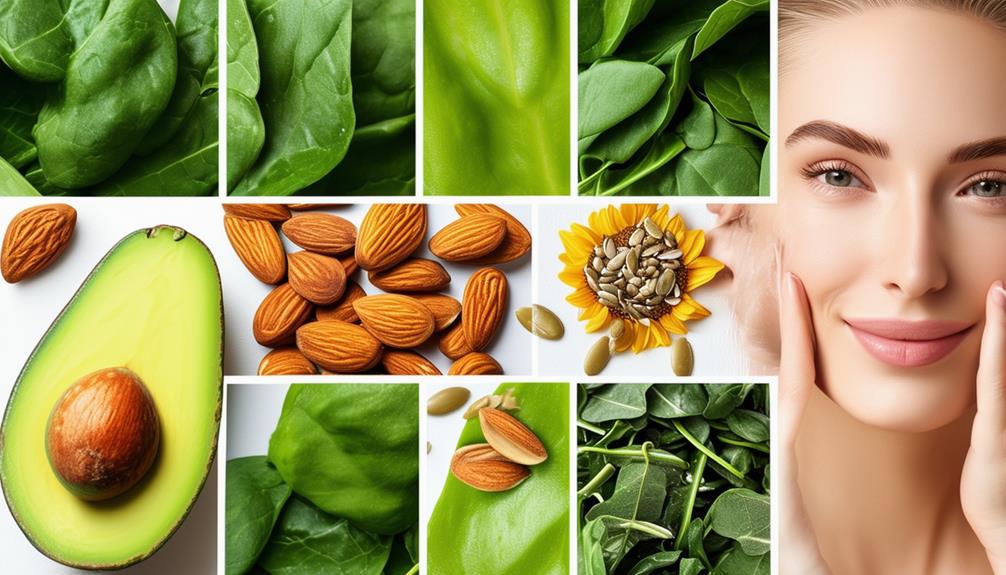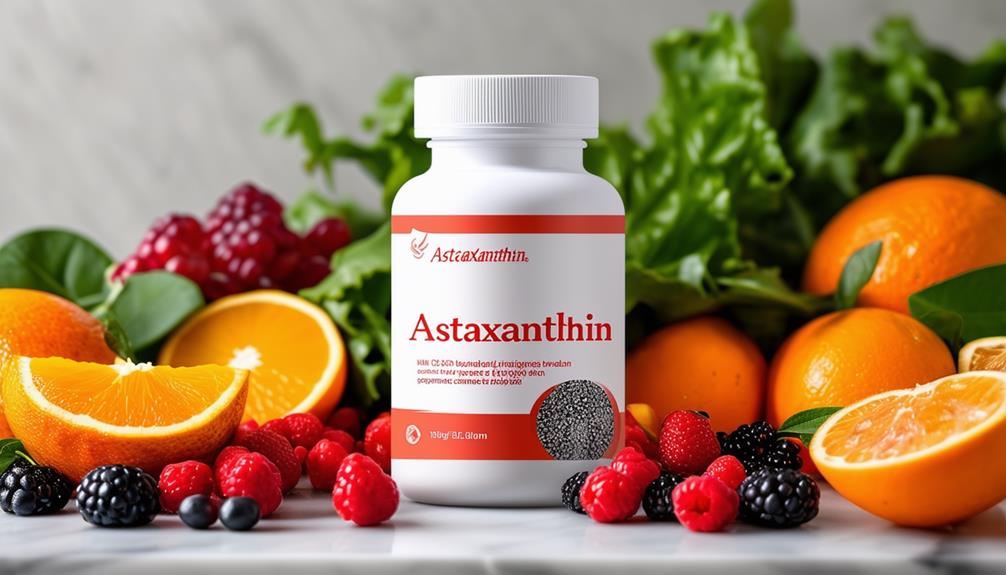Best Supplements for Anti-Aging Skin
When it comes to maintaining youthful skin, choosing the right supplements can be a game-changer. From collagen peptides to vitamin C, each ingredient plays a vital role in combating the signs of aging. But, what sets these supplements apart? Which one could be the missing piece in your skincare routine puzzle? Let's explore the science behind these powerhouse ingredients and how they can revolutionize your anti-aging regimen.
Collagen Peptides
To combat signs of aging skin, incorporating collagen peptides into your daily routine can help boost skin elasticity and firmness. Collagen is a protein that provides structure to your skin, giving it elasticity and helping reduce the appearance of wrinkles. As we age, our natural collagen production decreases, leading to sagging skin and wrinkles.
By supplementing with collagen peptides, you can support your body in maintaining healthy skin. Research has shown that collagen peptides can improve skin elasticity, making your skin appear more youthful and firm. These peptides work by stimulating collagen synthesis in the skin, helping to reduce the signs of aging such as fine lines and wrinkles.
Regular intake of collagen peptides can also enhance skin hydration, further contributing to a smoother and more supple complexion. Incorporating collagen peptides into your daily regimen, whether through supplements or collagen-rich foods, can be a beneficial addition to your anti-aging skincare routine.
Hyaluronic Acid
Boost your skin's hydration and plumpness by incorporating hyaluronic acid into your skincare routine.
Hyaluronic acid is a powerhouse ingredient known for its ability to attract and retain moisture, making it a go-to for combating dryness and fine lines. By applying hyaluronic acid serum or moisturizer onto damp skin, you can lock in moisture effectively, leaving your skin looking refreshed and rejuvenated.
The benefits of hyaluronic acid extend beyond hydration. It also helps to improve skin elasticity, making it appear firmer and more youthful. When used consistently, hyaluronic acid can contribute to a smoother complexion and a reduction in the appearance of wrinkles.
When applying hyaluronic acid, remember that less is more. A pea-sized amount is generally sufficient to cover the face and neck adequately.
While hyaluronic acid is generally safe for most skin types, some individuals may experience mild side effects such as skin irritation. It's essential to perform a patch test before full application to avoid any potential risks.
Vitamin C
Enhance your skin's radiance and combat signs of aging by incorporating Vitamin C into your skincare regimen.
Vitamin C is a powerhouse ingredient known for its skin brightening properties. It helps fade dark spots, even out skin tone, and give your complexion a healthy glow. Moreover, Vitamin C is a potent antioxidant that shields your skin from free radicals and environmental stressors, providing essential protection against premature aging.
When applied topically, Vitamin C aids in collagen production, which helps maintain skin elasticity and firmness, reducing the appearance of fine lines and wrinkles. This antioxidant protection not only fights off damage caused by UV radiation but also assists in repairing existing sun-induced skin issues.
To maximize the benefits of Vitamin C, look for serums or moisturizers with a stable form of this vitamin and incorporate it into your daily skincare routine.
With consistent use, Vitamin C can help you achieve a more youthful, radiant complexion while safeguarding your skin from external aggressors.
Retinol
Consider incorporating retinol into your skincare routine to target fine lines, wrinkles, and uneven skin texture effectively. Retinol, a derivative of Vitamin A, offers numerous benefits for anti-aging skin. It stimulates collagen production, which can enhance skin elasticity and firmness, reducing the appearance of wrinkles over time.
Additionally, retinol aids in speeding up cell turnover, promoting smoother and more even skin texture. However, it's essential to be aware of potential side effects when using retinol. Common side effects may include skin dryness, redness, and flakiness, especially when starting with higher concentrations.
To minimize these effects, start with a lower concentration and gradually increase usage as your skin adjusts. It's also crucial to use sunscreen daily when incorporating retinol into your routine, as it can increase sun sensitivity.
Coenzyme Q10
How does Coenzyme Q10 benefit anti-aging skin?
Coenzyme Q10, also known as ubiquinone, is a powerful antioxidant naturally produced by the body. When applied topically or taken orally as a supplement, Coenzyme Q10 can help combat the signs of aging by neutralizing free radicals that contribute to skin damage. This antioxidant property helps reduce the appearance of fine lines and wrinkles, promoting a more youthful complexion.
When considering Coenzyme Q10 supplements for anti-aging, a typical dosage ranges from 50 to 200 milligrams per day, but it's essential to consult with a healthcare provider to determine the right amount for you.
While Coenzyme Q10 is generally well-tolerated, some individuals may experience mild side effects such as stomach upset or nausea. Additionally, Coenzyme Q10 can interact with certain medications like blood thinners or chemotherapy drugs, so it's crucial to discuss potential interactions with your healthcare provider before starting supplementation.
Incorporating Coenzyme Q10 into your skincare routine or diet can be a beneficial addition to your anti-aging regimen, helping you maintain a radiant and youthful appearance.
Omega-3 Fatty Acids
Omega-3 fatty acids play a crucial role in promoting skin health and combating the signs of aging. Incorporating fish oil benefits into your daily routine can help maintain skin elasticity, hydration, and overall appearance. These healthy fats are known for their anti-inflammatory properties, reducing redness and inflammation that often accompany skin aging.
To boost your omega-3 intake, consider adding fatty fish like salmon, mackerel, or sardines to your diet. Plant-based sources such as flaxseeds, chia seeds, and walnuts also offer omega-3 benefits. If dietary sources are insufficient, supplementation with high-quality fish oil capsules can be a convenient way to ensure you're meeting your body's needs.
When selecting a fish oil supplement, opt for products that are third-party tested for purity and potency. Look for supplements with higher concentrations of EPA and DHA, the two main types of omega-3 fatty acids crucial for skin health.
Zinc
Zinc plays a vital role in supporting skin health and combating the effects of aging. This essential mineral is known for its numerous benefits that contribute to maintaining youthful skin. Zinc acts as a powerful antioxidant, protecting your skin from harmful free radicals that accelerate the aging process.
By promoting cell regeneration and repair, zinc helps to maintain skin elasticity and firmness, reducing the appearance of fine lines and wrinkles.
Incorporating zinc-rich foods into your diet is a great way to boost your skin health. Some excellent sources of zinc include oysters, beef, chicken, nuts, seeds, and legumes. If you struggle to meet your zinc requirements through diet alone, consider taking a zinc supplement after consulting with a healthcare provider.
Remember that moderation is key, as excessive zinc intake can have adverse effects.
Resveratrol
Resveratrol, a potent antioxidant found in red grapes and berries, is gaining recognition for its potential anti-aging benefits for your skin. This powerful compound offers a variety of advantages for your skin health, making it a valuable addition to your anti-aging skincare routine.
Here are four compelling reasons why you should consider incorporating resveratrol into your daily regimen:
- Antioxidant Protection: Resveratrol helps combat free radicals that can damage skin cells and accelerate the aging process, promoting a more youthful appearance.
- Collagen Support: By stimulating collagen production, resveratrol can enhance skin elasticity and firmness, reducing the appearance of fine lines and wrinkles.
- Anti-Inflammatory Properties: This compound possesses anti-inflammatory effects that can soothe skin irritations and redness, promoting a calmer complexion.
- UV Protection: Research suggests that resveratrol may help protect the skin against UV damage, reducing the risk of premature aging caused by sun exposure.
Incorporating resveratrol from sources like red grapes and berries into your skincare routine can offer significant benefits for maintaining youthful and radiant skin.
Vitamin E
Considered a powerful antioxidant, Vitamin E plays a crucial role in promoting skin health and combatting signs of aging. When it comes to skin benefits, Vitamin E is known for its ability to protect the skin from damage caused by free radicals and UV radiation, helping to prevent wrinkles, fine lines, and age spots. This vitamin also supports skin cell regeneration and can improve overall skin texture and tone.
For optimal skin benefits, it's recommended to include Vitamin E in your daily skincare routine. The suggested dosage for adults is 15 mg per day. This can be easily achieved through a balanced diet that includes foods rich in Vitamin E such as nuts, seeds, spinach, and avocados. Additionally, Vitamin E supplements are available for those who may need an extra boost to meet their daily requirements.
Incorporating Vitamin E into your skincare regimen can help maintain youthful and radiant skin, making it a valuable addition to your anti-aging arsenal.
Glutathione
To further enhance your anti-aging skincare routine, let's explore the role of Glutathione in promoting skin health and combating signs of aging. Glutathione is a powerful antioxidant naturally produced in the body that plays a crucial role in protecting cells from damage and maintaining overall health.
When it comes to skincare, here's what you need to know about Glutathione:
- Glutathione Benefits: Known for its skin brightening and anti-aging properties, Glutathione helps reduce the appearance of fine lines and wrinkles, promoting a more youthful complexion.
- Dosage: The recommended dosage of Glutathione supplements varies depending on individual needs and health conditions. Consult with a healthcare provider to determine the appropriate dosage for you.
- Potential Side Effects: While Glutathione is generally well-tolerated, some individuals may experience side effects such as stomach upset or allergic reactions. Monitor your body's response when starting supplementation.
- Interactions: Glutathione may interact with certain medications or conditions. It's essential to inform your healthcare provider about all supplements and medications you're taking to avoid any potential interactions.
Astaxanthin
Astaxanthin, a potent antioxidant found in seafood like salmon and shrimp, is gaining recognition for its impressive anti-aging properties and benefits for skin health. This powerhouse compound helps combat oxidative stress, reducing the signs of aging such as wrinkles and fine lines. Astaxanthin benefits the skin by improving moisture levels, elasticity, and overall texture, giving you a more youthful appearance.
When considering adding Astaxanthin to your skincare routine, the recommended dosage typically ranges from 4mg to 12mg daily. It's important to note that this dosage may vary based on individual needs and health conditions, so consulting with a healthcare provider is advisable.
Sources of Astaxanthin include wild-caught salmon, krill oil, and supplements derived from microalgae. While generally safe for most people, potential side effects of Astaxanthin are rare but may include mild symptoms like changes in skin pigmentation or digestive upset. As with any supplement, it's crucial to purchase from reputable sources and follow the recommended dosage guidelines for optimal results.
Biotin
Biotin, also known as vitamin B7, plays a crucial role in maintaining healthy skin, hair, and nails. This essential nutrient offers a range of benefits for your overall well-being, with a particular focus on promoting hair growth.
Here are four reasons why incorporating biotin into your daily routine can help you achieve healthier skin and stronger hair:
- Supports Hair Growth: Biotin is known for its ability to encourage hair growth and combat hair thinning or loss.
- Enhances Skin Health: By supporting the production of fatty acids in the skin, biotin helps maintain a glowing and youthful complexion.
- Strengthens Nails: Biotin contributes to stronger nails, reducing brittleness and promoting overall nail health.
- Boosts Metabolism: This vitamin aids in the metabolism of fats, carbohydrates, and proteins, which are essential for healthy skin and hair.
Integrating biotin into your daily supplement regimen can be a valuable addition to your anti-aging skincare routine, promoting not just external beauty but also overall health.
Frequently Asked Questions
Can I Combine Multiple Anti-Aging Supplements for Better Results?
When combining anti-aging supplements, consider the interaction and potential synergistic effects. Research the effectiveness comparison of the supplements you're considering. Consult a healthcare provider for personalized advice to ensure optimal results for your skin.
Are There Any Potential Side Effects of These Supplements?
You may wonder about potential risks, but with supplements, always consider the long-term effects. Balancing benefits with caution is key. Research thoroughly, consult professionals, and monitor your body's response for optimal safety.
How Long Does It Take to See Visible Improvements in Skin?
Improvements in your skin's appearance vary based on factors like skincare routine, dietary changes, hydration levels, and lifestyle modifications. Generally, visible changes may be noticeable within a few weeks to a couple of months.
Should I Consult a Dermatologist Before Starting These Supplements?
Before starting these supplements, it's wise to consult a dermatologist for expert opinion and safety precautions. They can advise on potential risks and alternative options tailored to your skin. Prioritize your skin health.
Can These Supplements Be Taken With Other Medications or Skincare Products?
You should be cautious about potential interactions when mixing supplements, medications, or skincare products. It's best to consult a healthcare provider if you have compatibility concerns. Your health and skin deserve personalized attention.
Conclusion
Incorporating key supplements like collagen peptides, hyaluronic acid, and vitamin C into your skincare routine can help combat signs of aging and promote a youthful complexion.
Did you know that studies have shown collagen peptides can improve skin elasticity by up to 7% after just 4 weeks of use?
By adding these essential nutrients to your regimen, you can enhance the effectiveness of your anti-aging efforts and achieve radiant, healthy skin.
